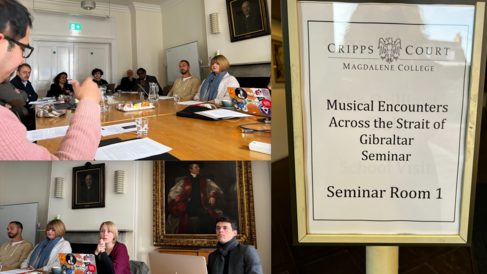
Dr Vanessa Paloma Elbaz is a researcher based in the Faculty of Music at the University of Cambridge. A member of the Cambridge Interfaith Research Forum from its inception, she reports on the outcomes of a recent workshop funded by the Forum's small grant scheme:
On January 24, 2023, we hosted a closed workshop entitled Trance, Ritual Sound and Migration at Magdelene College. It was done with support from the Wiener Anspach Foundation, the Musical Encounters Across the Strait of Gibraltar ERC project and the CIP Small Grant scheme. Participants included Ankur Barua (Divinity, Cambridge University); Shihan Desilva (School of International Affairs, University of London); Vanessa Paloma Elbaz (Music & CIP, Cambridge University); Carlos Fonseca (MMLL, Cambridge University); Jean Khalfa (Philosophy/Trinity, Cambridge University); Samuel Llano (Spanish Studies, University of Manchester); Peter McMurray (Music, Cambridge University); Hélène Sechehaye (Music Conservatoire, Université Libre de Bruxelles).
Jean Khalfa, who was slated to participate was not able to come due to an obligation at the French Embassy in London on the same day, but his paper on trance, insanity and French colonial medicine was pre-circulated amongst the participants. Also in attendance, but not contributing with a paper were Ioanna Sitaridou from MMLL, Edward Wilson Lee from English/Sidney Sussex, Peter Asimov from Music, Hemal Jayasuriya, a drummer and dancer of the Sri Lankan tradition and a Doctoral student from Divinity, and an MPhil student from Music.
Various elements facilitated a highly productive exchange within a short period of time: The interdisciplinarity of the participants and attendees brought forth theoretical ideas that cut through disciplines. The variety of linguistic and geographical placements of each case study promoted the possibility for an overarching theorisation of shared elements beyond local distinctions. Finally, the time limit of each presentation (10 minutes) forced speakers to distil their key ideas. These three elements made this initial exploratory workshop fruitful.
A recurring topic that emerged throughout the various presentations concerned the oscillatory borders between trance and music as mediators between what are often perceived as religious and non-religious realms. These intersecting uses of music, trance and beingness in turn affect the discourses around belonging, identity and nation which reoccur in all the examples discussed.
Dr. Sechehaye will be coming back to Cambridge in April/June. We plan further discussion and possibly another workshop with most of the participants. There is interest in preparing a special issue on trance, music and migration for the Journal of Religions.
